最新人教版七年级下英语课文翻译四单元
七年级下人教英语课文翻译
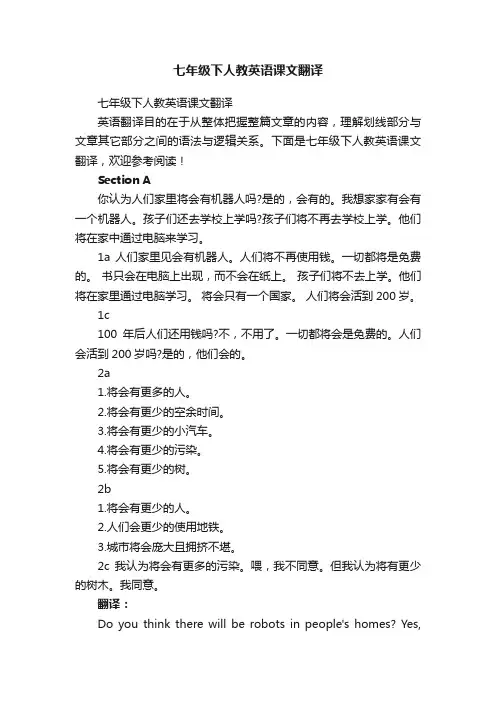
七年级下人教英语课文翻译七年级下人教英语课文翻译英语翻译目的在于从整体把握整篇文章的内容,理解划线部分与文章其它部分之间的语法与逻辑关系。
下面是七年级下人教英语课文翻译,欢迎参考阅读!Section A你认为人们家里将会有机器人吗?是的,会有的。
我想家家有会有一个机器人。
孩子们还去学校上学吗?孩子们将不再去学校上学。
他们将在家中通过电脑来学习。
1a 人们家里见会有机器人。
人们将不再使用钱。
一切都将是免费的。
书只会在电脑上出现,而不会在纸上。
孩子们将不去上学。
他们将在家里通过电脑学习。
将会只有一个国家。
人们将会活到200岁。
1c100年后人们还用钱吗?不,不用了。
一切都将会是免费的。
人们会活到200岁吗?是的,他们会的。
2a1.将会有更多的人。
2.将会有更少的空余时间。
3.将会有更少的小汽车。
4.将会有更少的污染。
5.将会有更少的树。
2b1.将会有更少的人。
2.人们会更少的使用地铁。
3.城市将会庞大且拥挤不堪。
2c 我认为将会有更多的污染。
喂,我不同意。
但我认为将有更少的树木。
我同意。
翻译:Do you think there will be robots in people's homes? Yes,there will be. I think there will be a robot in my family. Are the children going to school? The children will not go to school. They will learn through the computer at home.1A people see robots at home. People will no longer use money. Everything will be free. The book will only appear on the computer, not on the paper. The children will not go to school. They are going to study by computer at home. There will be only one country. People will live to be 200 years old.1CDo people use money in 100 years? No, no, no. Everything will be free. Will people live to be 200 years old? Yes, they will.2AThere will be more people in 1..2. will have less spare time.3. there will be fewer cars.4. there will be less pollution.5. will have fewer trees.2BThere will be fewer people in 1..2. people will use the subway less.The 3. cities will be huge and crowded.2C I think there will be more pollution. Hello, I don't agree. But I think there will be fewer trees. I agree。
人教版选修七第四单元课文翻译
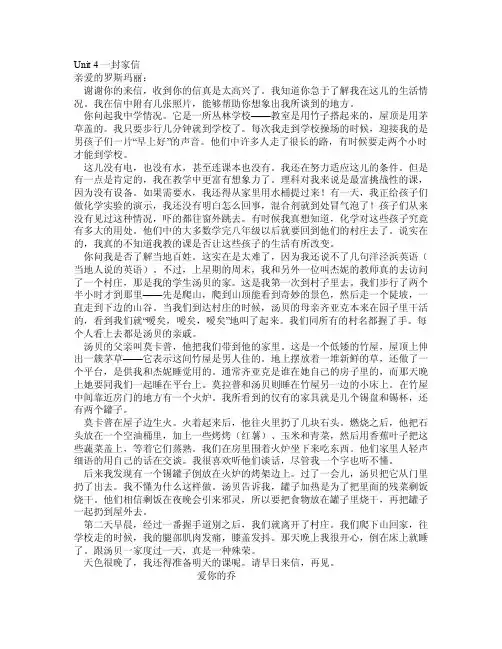
Unit 4一封家信亲爱的罗斯玛丽:谢谢你的来信,收到你的信真是太高兴了。
我知道你急于了解我在这儿的生活情况。
我在信中附有几张照片,能够帮助你想象出我所谈到的地方。
你问起我中学情况。
它是一所丛林学校——教室是用竹子搭起来的,屋顶是用茅草盖的。
我只要步行几分钟就到学校了。
每次我走到学校操场的时候,迎接我的是男孩子们一片“早上好”的声音。
他们中许多人走了很长的路,有时候要走两个小时才能到学校。
这儿没有电,也没有水,甚至连课本也没有。
我还在努力适应这儿的条件。
但是有一点是肯定的,我在教学中更富有想象力了。
理科对我来说是最富挑战性的课,因为没有设备。
如果需要水,我还得从家里用水桶提过来!有一天,我正给孩子们做化学实验的演示,我还没有明白怎么回事,混合剂就到处冒气泡了!孩子们从来没有见过这种情况,吓的都往窗外跳去。
有时候我真想知道,化学对这些孩子究竟有多大的用处。
他们中的大多数学完八年级以后就要回到他们的村庄去了。
说实在的,我真的不知道我教的课是否让这些孩子的生活有所改变。
你问我是否了解当地百姓。
这实在是太难了,因为我还说不了几句洋泾浜英语(当地人说的英语)。
不过,上星期的周末,我和另外一位叫杰妮的教师真的去访问了一个村庄,那是我的学生汤贝的家。
这是我第一次到村子里去。
我们步行了两个半小时才到那里——先是爬山,爬到山顶能看到奇妙的景色,然后走一个陡坡,一直走到下边的山谷。
当我们到达村庄的时候,汤贝的母亲齐亚克本来在园子里干活的,看到我们就“嗳矣,嗳矣,嗳矣”地叫了起来。
我们同所有的村名都握了手。
每个人看上去都是汤贝的亲戚。
汤贝的父亲叫莫卡普,他把我们带到他的家里。
人教版英语七年级下册第四单元sectionb 2b 译文
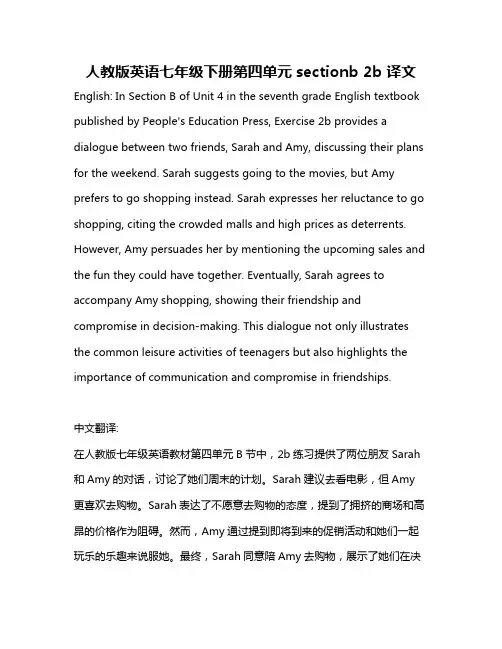
人教版英语七年级下册第四单元sectionb 2b 译文English: In Section B of Unit 4 in the seventh grade English textbook published by People's Education Press, Exercise 2b provides a dialogue between two friends, Sarah and Amy, discussing their plans for the weekend. Sarah suggests going to the movies, but Amy prefers to go shopping instead. Sarah expresses her reluctance to go shopping, citing the crowded malls and high prices as deterrents. However, Amy persuades her by mentioning the upcoming sales and the fun they could have together. Eventually, Sarah agrees to accompany Amy shopping, showing their friendship and compromise in decision-making. This dialogue not only illustrates the common leisure activities of teenagers but also highlights the importance of communication and compromise in friendships.中文翻译:在人教版七年级英语教材第四单元B节中,2b练习提供了两位朋友Sarah 和Amy的对话,讨论了她们周末的计划。
人教版英语七年级下册Unit 4听力原文及翻译
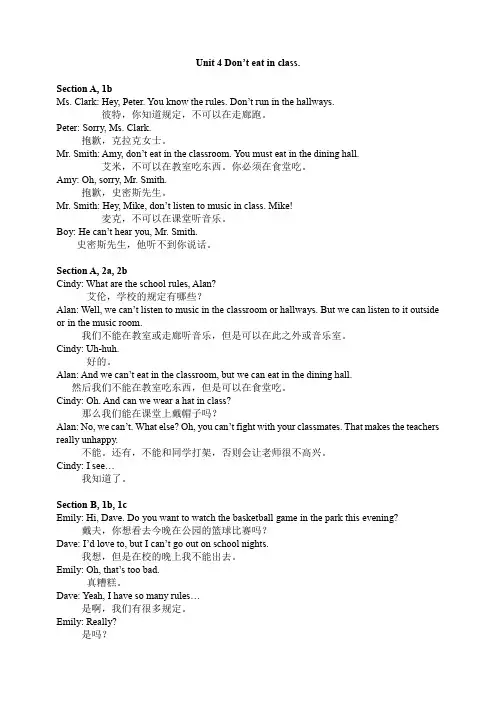
Unit 4 Don’t eat in class.Section A, 1bMs. Clark: Hey, Peter. You know the rules. Don’t run in the hallways.彼特,你知道规定,不可以在走廊跑。
Peter: Sorry, Ms. Clark.抱歉,克拉克女士。
Mr. Smith: Amy, don’t eat in the classroom. You must eat in the dining hall.艾米,不可以在教室吃东西。
你必须在食堂吃。
Amy: Oh, sorry, Mr. Smith.抱歉,史密斯先生。
Mr. Smith: Hey, Mike, don’t listen to music in class. Mike!麦克,不可以在课堂听音乐。
Boy: He can’t hear you, Mr. Smith.史密斯先生,他听不到你说话。
Section A, 2a, 2bCindy: What are the school rules, Alan?艾伦,学校的规定有哪些?Alan: Well, we can’t listen to music in the classroom or hallways. But we can listen to it outside or in the music room.我们不能在教室或走廊听音乐,但是可以在此之外或音乐室。
Cindy: Uh-huh.好的。
Alan: And we can’t eat in the classroom, but we can eat in the dining hall.然后我们不能在教室吃东西,但是可以在食堂吃。
Cindy: Oh. And can we wear a hat in class?那么我们能在课堂上戴帽子吗?Alan: No, we can’t. What else? Oh, you can’t fight with your classmates. That makes the teachers really unhappy.不能。
新版(人教版)七年级(下)英语Unit4课文详解
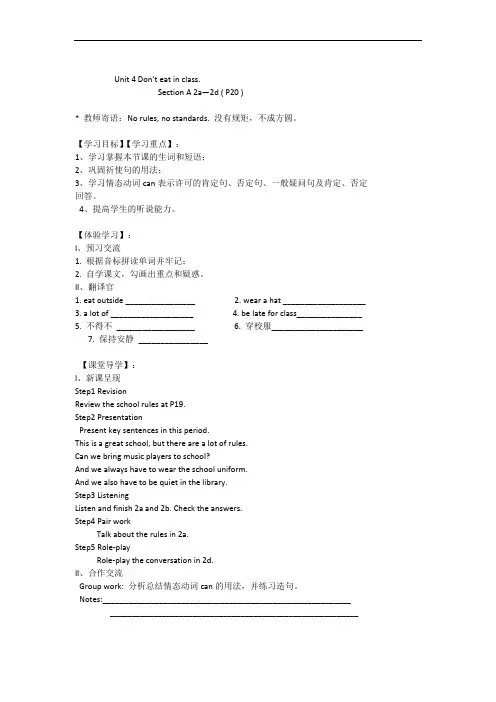
Unit 4 Don’t eat in class.Section A 2a—2d ( P20 )* 教师寄语:No rules, no standards. 没有规矩,不成方圆。
【学习目标】【学习重点】:1、学习掌握本节课的生词和短语;2、巩固祈使句的用法;3、学习情态动词can表示许可的肯定句、否定句、一般疑问句及肯定、否定回答。
4、提高学生的听说能力。
【体验学习】:I、预习交流1. 根据音标拼读单词并牢记;2. 自学课文,勾画出重点和疑惑。
II、翻译官1. eat outside ________________2. wear a hat ___________________3. a lot of ___________________4. be late for class_______________5. 不得不__________________6. 穿校服_____________________7. 保持安静________________【课堂导学】:I、新课呈现Step1 RevisionReview the school rules at P19.Step2 PresentationPresent key sentences in this period.This is a great school, but there are a lot of rules.Can we bring music players to school?And we always have to wear the school uniform.And we also have to be quiet in the library.Step3 ListeningListen and finish 2a and 2b. Check the answers.Step4 Pair workTalk about the rules in 2a.Step5 Role-playRole-play the conversation in 2d.II、合作交流Group work: 分析总结情态动词can的用法,并练习造句。
新版七年级下册Unit1-12 2b翻译
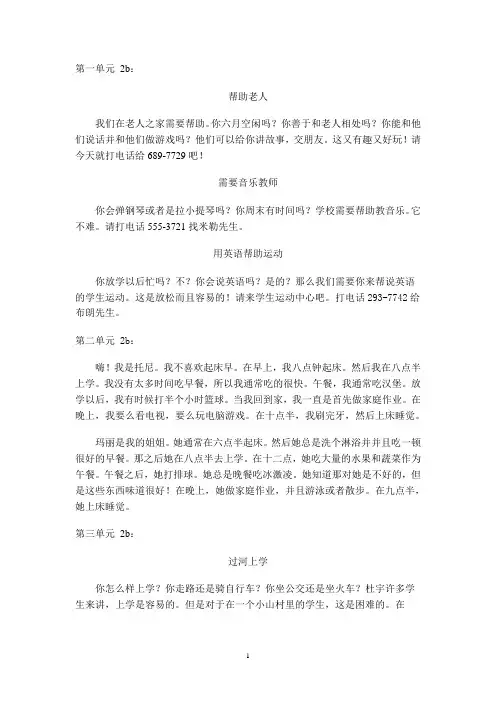
第一单元2b:帮助老人我们在老人之家需要帮助。
你六月空闲吗?你善于和老人相处吗?你能和他们说话并和他们做游戏吗?他们可以给你讲故事,交朋友。
这又有趣又好玩!请今天就打电话给689-7729吧!需要音乐教师你会弹钢琴或者是拉小提琴吗?你周末有时间吗?学校需要帮助教音乐。
它不难。
请打电话555-3721找米勒先生。
用英语帮助运动你放学以后忙吗?不?你会说英语吗?是的?那么我们需要你来帮说英语的学生运动。
这是放松而且容易的!请来学生运动中心吧。
打电话293-7742给布朗先生。
第二单元 2b:嗨!我是托尼。
我不喜欢起床早。
在早上,我八点钟起床。
然后我在八点半上学。
我没有太多时间吃早餐,所以我通常吃的很快。
午餐,我通常吃汉堡。
放学以后,我有时候打半个小时篮球。
当我回到家,我一直是首先做家庭作业。
在晚上,我要么看电视,要么玩电脑游戏。
在十点半,我刷完牙,然后上床睡觉。
玛丽是我的姐姐。
她通常在六点半起床。
然后她总是洗个淋浴并并且吃一顿很好的早餐。
那之后她在八点半去上学。
在十二点,她吃大量的水果和蔬菜作为午餐。
午餐之后,她打排球。
她总是晚餐吃冰激凌。
她知道那对她是不好的,但是这些东西味道很好!在晚上,她做家庭作业,并且游泳或者散步。
在九点半,她上床睡觉。
第三单元2b:过河上学你怎么样上学?你走路还是骑自行车?你坐公交还是坐火车?杜宇许多学生来讲,上学是容易的。
但是对于在一个小山村里的学生,这是困难的。
在在河上没有桥,并且对于小船来说河水流的太快了。
所以这些学生通过索道穿过河去上学。
一个十一岁的男孩,亮亮,每天穿过河。
但是他不害怕。
“我喜欢和我的同班同学一起玩,我也喜欢我的老师。
他对于我来说像父亲一样。
”许多学生和村民从来没有离开过山村。
有一座桥桥是他们的梦想。
他们的梦想可以实现吗?第四单元2b:亲爱的知道先生,有太多规则了!在上午六点钟,我的妈妈说:“现在起床叠被子!”早餐以后,我的妈妈一直说:“不要把脏盘子留在厨房里”。
人教版英语七年级下册Unit4听力原文及翻译
人教版英语七年级下册Unit4听力原文及翻译Unit 4 Don’t eat in class.Section A, 1bMs. Clark: Hey, Peter. You know the rules. Don’t run in the hallways.彼特,你知道规定,不可以在走廊跑。
Peter: Sorry, Ms. Clark.抱歉,克拉克女士。
Mr. Smith: Amy, don’t eat in the classroom. You must eat in the dining hall.艾米,不可以在教室吃东西。
你必须在食堂吃。
Amy: Oh, sorry, Mr. Smith.抱歉,史密斯先生。
Mr. Smith: Hey, Mike, don’t listen to music in class. Mike!麦克,不可以在课堂听音乐。
Boy: He can’t hear you, Mr. Smith.史密斯先生,他听不到你说话。
Section A, 2a, 2bCindy: What are the school rules, Alan?艾伦,学校的规定有哪些?Alan: Well, we can’t listen to music in the classroom or hallways. But we can listen to it outside or in the music room.我们不能在教室或走廊听音乐,但是可以在此之外或音乐室。
Cindy: Uh-huh.好的。
Alan: And we can’t eat in the classroom, but we can eat in the dining hall.然后我们不能在教室吃东西,但是可以在食堂吃。
Cindy: Oh. And can we wear a hat in class?那么我们能在课堂上戴帽子吗?Alan: No, we can’t. What else? Oh, you can’t fight with your classmates. That makes the teachers really unhappy.不能。
七下第四单元英语课文
七下第四单元英语课文In the fourth unit of the seventh grade English textbook, the lesson focuses on a story about a young boy named Tom who finds a lost dog and decides to take care of it. The story revolves around the theme of responsibility and the importance of taking care of animals. It also touches upon the bond between humans and animals and the impact of kindness and compassion.From a literary perspective, the story is well-crafted and engaging for young readers. It effectively conveys the message of responsibility and compassion through the character of Tom and his actions towards the lost dog. The narrative structure and language used in the story are suitable for the target age group and help to captivate their attention. The story also provides an opportunity for students to discuss and reflect on the moral lessons it imparts, making it a valuable addition to the English curriculum.From an educational standpoint, the story offersvarious opportunities for language learning and skill development. Students can practice reading, comprehension, and vocabulary acquisition through the text. Additionally, the story can be used as a springboard for discussions on ethical and moral issues, encouraging critical thinking and empathy among students. It also provides a platform for teachers to integrate lessons on animal welfare and responsible pet ownership, promoting a holistic approach to education.On a personal level, the story resonates with many students who may have experienced similar situations orhave a fondness for animals. It evokes feelings of empathy and compassion, prompting students to reflect on their own actions and the impact they can have on the lives of others, including animals. The story may also inspire students to consider the importance of kindness and responsibility in their own lives, fostering a sense of empathy and moral awareness.From a societal perspective, the story carries a timelymessage about the treatment of animals and the responsibilities that come with caring for them. It highlights the need for compassion and understanding towards animals, promoting a more humane and ethical approach to animal welfare. By incorporating such stories into the curriculum, schools can play a role in shaping the values and attitudes of future generations towards animals and the environment.In conclusion, the fourth unit of the seventh grade English textbook offers a thought-provoking and impactful story that resonates with students on multiple levels. It provides literary, educational, personal, and societal benefits, making it a valuable addition to the curriculum. The story of Tom and the lost dog serves as a reminder of the importance of responsibility, compassion, and empathy, and its inclusion in the curriculum has the potential to shape the values and attitudes of young learners.。
七年级下册英语课文翻译(人教版新目标)
艾米莉:哇,你确实有很多规则!
第五单元 为什么你喜欢熊猫?
A部分,1b
对话1
女孩:让我们先看熊猫.他们是我最喜欢的动物.
男孩:为什么?
女孩:因为他们可爱.
对话2
男孩:让我们看长颈鹿.
女孩:为什么你想看它们?
记者:那么早!但你起床早.
汤姆:嗯.
第三单元 你怎么样上学?
A部分,1b
男孩:鲍勃和玛丽怎么样上学?
女孩:鲍勃坐火车,玛丽坐地铁.
男孩:约翰怎么样上学?
女孩:他乘公交车.
男孩:鲍尔和杨艳怎么样上学?
女孩:他们走路.看那是现在的他们!
男孩:吉姆走路上学吗?
女孩:不,他不.他骑自行车.
玛丽:哦,托尼!所以,你想去哪里?
托尼:让我们看熊猫.它们有点可爱.
玛丽:哦,好的.我爱熊猫.它们漂亮.但是他们也有点害羞.它们在哪里?
托尼:它们在那里,离考拉不远.
第六单元 我正在看电视
A部分,1b
鲍勃:你好,詹妮!
詹妮:你好,鲍勃!
鲍勃:詹妮,你正在做什么?
詹妮:我正在看电视.
鲍勃:是的,是远.所以我去那里看我的祖父母一年只一到两次.
玛丽:你怎么样到那里?
鲍勃:我通常乘火车.
玛丽:花多久?
鲍勃:大约六个小时.然后我们从火车站坐公交车到他们家.
玛丽:哇.那是一个长旅行.
第四单元 不要在课堂上吃东西
A部分,1b
克拉克夫人:嘿,皮特.你只规则的.不要在走廊里跑.
B:不,他没有.他正在打篮球.
(完整版)七年级英语下册全课文翻译
(完整版)七年级英语下册全课文翻译(完整版)七年级英语下册全课文翻译(这里是正文,下面是课文的翻译内容。
注意根据字数要求可能还需要进一步的拓展。
)1. Unit 1 My New School 我的新学校Welcome to my new school! 欢迎来到我的新学校!I am a student at Sunshine Middle School. 我是阳光中学的一名学生。
Our school is big and beautiful. 我们的学校又大又漂亮。
The classrooms are clean and bright. 教室干净明亮。
We have a library, a computer room, and a science lab. 我们有图书馆、电脑房和实验室。
I like my new school. 我喜欢我的新学校。
2. Unit 2 What's this in English? 这个用英语怎么说?What's this in English? 这个用英语怎么说?It's a book. 这是一本书。
What's that in English? 那个用英语怎么说?It's a pen. 那是一支钢笔。
What are these in English? 这些用英语怎么说?They are pencils. 它们是铅笔。
What are those in English? 那些用英语怎么说?They are rulers. 它们是尺子。
3. Unit 3 My weekend activities 我的周末活动What do you usually do on weekends? 你周末通常做什么?I usually play soccer with my friends. 我通常和朋友们一起踢足球。
Sometimes, I watch movies or go shopping. 有时候,我会看电影或者去购物。
- 1、下载文档前请自行甄别文档内容的完整性,平台不提供额外的编辑、内容补充、找答案等附加服务。
- 2、"仅部分预览"的文档,不可在线预览部分如存在完整性等问题,可反馈申请退款(可完整预览的文档不适用该条件!)。
- 3、如文档侵犯您的权益,请联系客服反馈,我们会尽快为您处理(人工客服工作时间:9:00-18:30)。
四单元
Section A
图片不要在走廊里奔跑。
对不起,克拉克女士。
1a 学校制度上课不要迟到,你一定要准时。
不要在走廊里奔跑。
不要在教室里吃东西。
你必须在餐厅里吃。
不要在课堂上听音乐。
不要打架。
1c规章制度是什么?噢,我们上课不能迟到。
我们必须准时。
2a在教室或走廊里听音乐在教室里听音乐在外面听音乐在教室里吃东西在餐厅里吃东西在外面吃东西戴帽子打架
2c 辛迪,我们能听音乐吗?我们不能在走廊里听音乐,但我们可以在外面听。
2d嗨,我的名字叫约翰。
这是我在学校的第一天。
嗨,约翰,我是艾丽斯。
这是一所极好的学校,但是有许多规则。
真的吗?规则当中的一些是什么?嗯,不要上课迟到。
这是非常重要的。
好吧,所以我们必须准时。
我们可以带音乐播放器到学校吗?不,我们不可以。
并且我们总是不得不穿校服。
我明白了。
噢,并且我们也不得不在图书馆里保持安静。
Grammar Focus 不要在走廊里跑。
不要打架。
规则是什么? 我们必须按时上课。
我们可以在教室里吃东西吗?不,我们不可以,但可以在餐厅吃饭。
我们可以在课堂上戴帽子吗?是的,我们可以。
/不,我们不可以。
他不得不在学校穿校服吗?是的,他是。
/不他不是。
你们不得不做什么?我们不得不在图书馆里安静。
3a 不要谈话
3b 安静?她不得不在图书馆保持安静吗?(她/不得不/在图书馆)是的,她不得不。
3c在我梦想中的学校,我们不必每天来学校。
我们……1.我们可以在课堂上吃东西。
2.我们不必每天来学校。
Section B
1b外出上学期间的晚上看望朋友做他的家庭作业练习弹吉他清洗餐具看电视帮助他的妈妈做早饭打扫他的房间
1c 在上学期间的晚上每周六在晚饭前在晚上在上学的日子里晚饭后放学后每天早上/上午
1d戴夫在上学期间的晚上可以外出吗?不,他不可以。
2b 亲爱的万事通博士,
有太多的规则!在早晨6:00,我妈妈说:“现在起床并整理你的床铺!”早饭后,我妈妈总是说:“不要把脏盘子留在厨房里!”洗完盘子后,我因为不能迟到而跑向学校。
在学校,我们有更多的规则—不要吵闹,不要在课堂上吃东西……
我的爸爸说放学后我不能打篮球因为我必须做家庭作业。
我仅仅在周末能玩。
晚饭后,我也不能放松。
我在看电视之前必须先读书。
但是十点前我上床睡觉。
规则、规则、规则!太可怕了!我能做什么,万事通博士?
莫莉·布朗纽约亲爱的莫莉,
我知道你感觉怎样。
人们总是告诉我们,“不要这样做!”或“你不能那样做!”但是,考虑一下这件事,莫莉。
你可以做许多事情。
你可以在周末打篮球。
你可以在读书后看电视。
父母和学校有时是严格的,但是记住,他们制定规则是为了帮助我们。
我们不得不遵守它们。
好运!万事通博士3a亲爱的万事通博士,
你可以帮助我吗?我不快乐,因为在家里有太多的规则。
每天早上,我不得不/必须六点钟起床。
在学校,我不得不/必须穿校服,并且我不得不/必须留短发。
放学后,我不能和我的朋友一起玩或者看电视,因为我不得不/必须做作业。
在周末,我也不能放松,因为我不得不/必须学弹钢琴。
我从未过得快乐。
我能做什么?
赵培Self check
1我是老鼠蒂米。
我必须在每天早上6:30起床。
然后我得去厨房为爷爷觅食。
我去厨房从不迟到因为我得在猫起床前到那儿。
我的爷爷总是告诉我不能吵闹。
我听他的话,因为我不想要猫抓住我!我的爷爷对我要求严格,但我认为遵守规则是最好的!
2上课不要迟到。
我们上课不能迟到。
